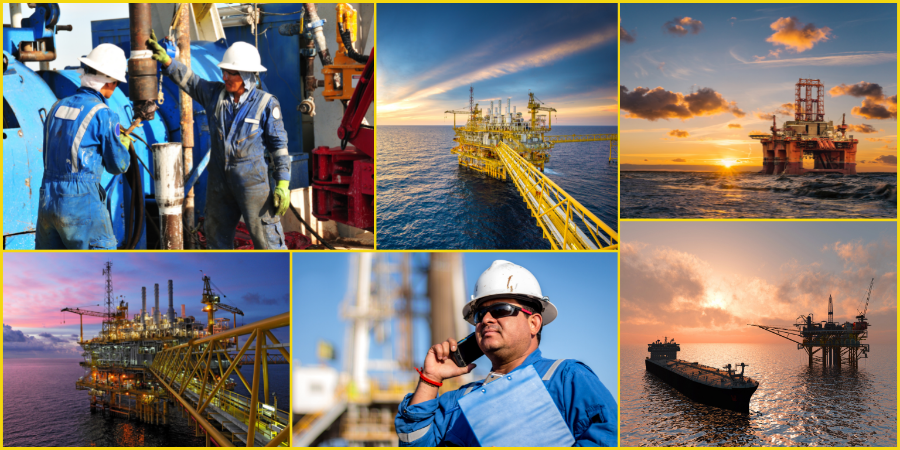
Oil Rig Life - What's It Like Living On An Offshore Oil Platform?
27 Mar, 20192:50Since the mid-1950s, oil has become one of the world's most vital energy sources. It is the...

Since the mid-1950s, oil has become one of the world's most vital energy sources. It is the lifeblood of modern society. It is used most commonly to supply energy to the power industry, heat our homes, and provide fuel for planes and vehicles to transport people and goods worldwide.
Due to its vital role in modern society, a career in the oil industry can be both fascinating and rewarding. Those working in the industry may find themselves working on one of the vast numbers of offshore oil rigs spread worldwide. Have you ever wondered what life is like working on oil rings?
This article will provide insight into oil rig workers' training, responsibilities, and living experiences. First of all, let's take a look at some quick facts about life on oil rigs.
● There are around 1,470 offshore oil rigs around
the world, meaning this role could take you anywhere from the UK to Australia,
the Gulf of Mexico, or the Middle East.
● Oil rigs can be enormous and larger than many of
the earth's tallest buildings. Take the Bullwinkle oil rig in the Gulf of
Mexico, for example. At 1,736 feet (529m), it dwarfs both the Empire State
Building (381m) and the Eiffel Tower (330m).
● At any one time, you will find nearly 200 people
living and working on a rig.
● You'll rarely find a window inside. This is
mainly to protect the oil rig from the intense weather conditions it has to
withstand.
● Be thankful we're not in the 70s – Before onboard Wi-Fi, engineers were restricted to just one phone call a week, and even that was capped at just six minutes. Now, due to the power of modern technology, workers can keep in contact with friends and loved ones.
International engineering jobs require travel to some of the most remote places on earth, including oil rigs in the middle of the sea. You'll work hard offshore but be well rewarded for it - for a start, there's no cooking or cleaning.
Does it sound like your ideal job? Be sure to visit our dedicated oil and gas recruitment page, but first of all, let’s answer some of the vital questions you may have about life working on oil rigs.
What job-related training will I need to work on oil rigs?
This isn't your usual "stuck in rush hour" commute; a helicopter transfers you from the shore to the rig, which can be an invigorating experience. In addition, offshore engineers are given complete sea survival training before this flight. Watch a video of an offshore engineer commuting to an oil rig to see for yourself.
Oil rigs are full of combustible materials and heavy machinery. As an offshore worker, you will benefit from plenty of training to ensure best practices at all times.
Before
starting your offshore life, you will also undergo a medical examination to
ensure you're suitable for work on a rig. There are
first aiders and medicinal personnel onboard, with helicopters on standby for
quick medical evacuations to the shore if necessary.
How many hours will I work on oil rigs?
The
usual working shift is 12 hours ‘on’ and 12 hours ‘off’, and many shift
patterns are a mixture of both day and night because operations run around the
clock with no rig ‘downtime’. Many offshore jobs
require shift patterns of 2 or 3 weeks on the rig / 2-3 weeks onshore, but the
patterns can be longer.
What will my offshore accommodation be like?
Offshore installations have a dedicated team of kitchen staff who prepare food around the clock, often with a self-service style canteen. Despite the offshore location, fresh food is shipped in regularly, meaning you’ll have plenty of access to fresh meat, fruit and vegetables.
Oil rigs are close-knit communities, and you
can expect to share your room with several other engineers, although some offer
private rooms. Showers and toilets tend to be shared among a couple of cabins,
but most bedrooms offer a washbasin and a television.
How will I stay in touch with my family if I have a job overseas?
Far out at sea, mobile phone signals aren't particularly reliable! However, larger oil rigs will have internet connections enabling Zoom and other messaging services for uninterrupted communication with those back home, ensuring you’ll be on hand to help celebrate important occasions from afar. We’ve taken a look at some fantastic apps to help you stay in touch with your loved ones whilst on assignment.
Life is never boring on oil rigs
Offshore jobs pay differently depending on your experience and role. However, rig engineers can expect to be paid well due to a combination of the specialised skills required, the risks associated with working on a rig, and the personal sacrifices made in terms of working hours and not seeing family.
Keeping an oil rig
operational 24 hours a day means that offshore personnel must be at the top of
their game; generally, alcohol and non-prescription drugs are completely
banned. To keep everyone on board safe, smoking is allowed in designated areas
with matches available as the source of ignition – these locations are far away
from the most sensitive machinery.
What salary and benefits can I expect offshore?
Offshore jobs pay differently depending on your experience and role, however rig engineers can expect to be paid well due to a combination of the specialised skills required, the risks associated with working on a rig, and the personal sacrifices made in terms of working hours and not seeing family.
The oil and gas professionals that we work
with love how we value our contractors on a personal level and take care of all
assignment support needs, such as organising
contractor travel and work permits, giving you peace of mind that you’ll be
taken care of when working with us.
Fancy experiencing life on offshore oil rigs for yourself?
At NES Fircroft, we are a global industry-leading oil and gas recruitment solutions provider. We have over 50 years of experience finding exceptional talent for roles within the industry.
If you are a candidate
looking to take the next step in your career, please discover our dedicated oil
and gas recruitment page for more
details about how we can support you. Alternatively, search our jobs about available offshore oil and gas jobs.









